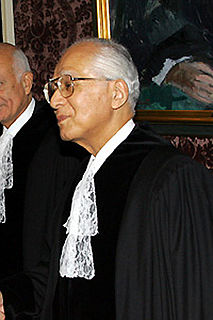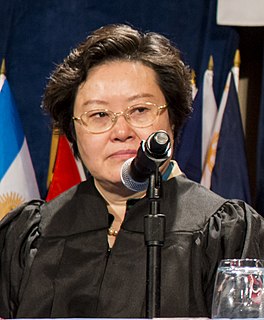A United Nations Security Council resolution is a UN resolution adopted by the fifteen members of the Security Council; the UN body charged with "primary responsibility for the maintenance of international peace and security".
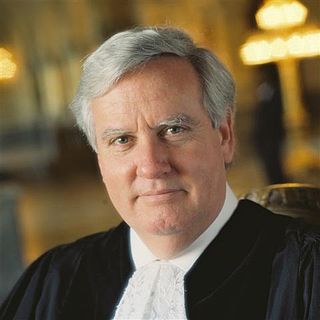
Sir Christopher John Greenwood is a former English judge at the International Court of Justice, on which he served from 2009 to 2018. Prior to his election, he was professor of international law at the London School of Economics and a barrister who regularly appeared as counsel before the International Court of Justice, the European Court of Human Rights, the English courts, and other tribunals.
Abdul Gadire Koroma is a Sierra Leonean jurist who served two terms as judge at the International Court of Justice.
United Nations Security Council Resolution 1914, adopted unanimously on 18 March 2010, after noting the resignation of International Court of Justice (ICJ) judge Shi Jiuyong and that the vacancy must be filled in accordance with the Statute of the ICJ, the Council decided that the election to fill the vacancy would take place on 29 June 2010 at a meeting of the Security Council and at a meeting of the General Assembly at its 64th session.

United Nations Security Council Resolution 1926, adopted unanimously on June 2, 2010, after noting the resignation of International Court of Justice (ICJ) judge Thomas Buergenthal with effect from September 6, 2010. The Council decided that the election to fill the vacancy would take place on September 9, 2010 at a meeting of the Security Council and at a meeting of the General Assembly.
Joan E. Donoghue is an American jurist, and a Judge on the International Court of Justice. She was elected to that post in 2010 and re-elected in 2014. She has two sons, Adam and Casey Shamma.

United Nations Security Council resolution 1571, adopted without a vote on 4 November 2004, after noting the resignation of International Court of Justice (ICJ) judge Gilbert Guillaume taking effect on 11 February 2005, the Council decided that elections to the vacancy on the ICJ would take place on 15 February 2005 at the Security Council and at a meeting of the General Assembly during its 59th session.

Julia Sebutinde is a Ugandan judge on the International Court of Justice. She also is the current chancellor of Muteesa I Royal University a university owned by Buganda kingdom. She has been a judge on the court since March 2012. She is the first African woman to sit on the ICJ. Before being elected to the ICJ, Sebutinde was a judge of the Special Court for Sierra Leone. She was appointed to that position in 2007.

The Sixty-sixth Session of the United Nations General Assembly opened on 13 September 2011 at 15:00 and was presided over by former Qatari permanent representative to the UN Nassir Abdulaziz Al-Nasser. The session ended on 18 September as al-Nasser symbolically passed the gavel to the president of the next session, Vuk Jeremic.
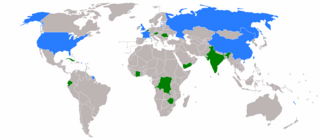
The 1990 United Nations Security Council election was held on 1 November 1990 during the Forty-fifth session of the United Nations General Assembly, held at United Nations Headquarters in New York City. The General Assembly elected Austria, Belgium, Ecuador, India, and Zimbabwe, as the five new non-permanent members of the UN Security Council for two-year mandates commencing on 1 January 1991.
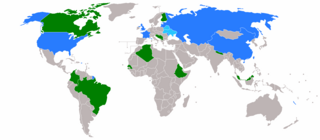
The 1988 United Nations Security Council election was held on 26 October 1988 during the Forty-third session of the United Nations General Assembly, held at United Nations Headquarters in New York City. The General Assembly elected Canada, Colombia, Ethiopia, Finland, and Malaysia, as the five new non-permanent members of the UN Security Council for two-year mandates commencing on 1 January 1989.

The 1987 United Nations Security Council election was held on 15 October 1987 during the Forty-second session of the United Nations General Assembly, held at United Nations Headquarters in New York City. The General Assembly elected Algeria, Brazil, Nepal, Senegal, and Yugoslavia, as the five new non-permanent members of the UN Security Council for two-year mandates commencing on 1 January 1988.

The 1982 United Nations Security Council election was held on 19 October 1982 during the Thirty-seventh session of the United Nations General Assembly, held at United Nations Headquarters in New York City. The General Assembly elected Malta, the Netherlands, Nicaragua, Pakistan, and Zimbabwe, as the five new non-permanent members of the UN Security Council for two-year mandates commencing on 1 January 1983.

The 1971 United Nations Security Council election was held on 23 November 1971 during the Twenty-sixth session of the United Nations General Assembly, held at United Nations Headquarters in New York City. The General Assembly elected Guinea, India, Panama, Sudan, and Yugoslavia, as the five new non-permanent members of the UN Security Council for two-year mandates commencing on 1 January 1972.

The 1969 United Nations Security Council election was held on 20 October 1969 during the Twenty-fourth session of the United Nations General Assembly, held at United Nations Headquarters in New York City. The General Assembly elected the Burundi, Nicaragua, Poland, Sierra Leone, and Syria, as the five new non-permanent members of the UN Security Council for two-year mandates commencing on 1 January 1970.
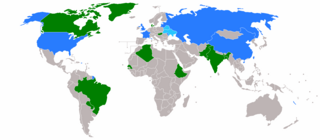
The 1967 United Nations Security Council election was held on 6 November 1967 during the Twenty-second session of the United Nations General Assembly, held at United Nations Headquarters in New York City. The General Assembly elected Algeria, Hungary, Pakistan, Paraguay, and Senegal, as the five new non-permanent members of the UN Security Council for two-year mandates commencing on 1 January 1968.

The 1966 United Nations Security Council election was held on 11 November 1966 during the Twenty-first session of the United Nations General Assembly, held at United Nations Headquarters in New York City. The General Assembly elected Brazil, Canada, Denmark, Ethiopia, and India, as the five new non-permanent members of the UN Security Council for two-year mandates commencing on 1 January 1967.
The 2014 International Court of Justice election began on 6 November 2011 at United Nations Headquarters in New York City. In the set of triennial elections, the General Assembly and the Security Council concurrently elect five judges to the Court for nine-year terms, in this case beginning on 6 February 2015.

